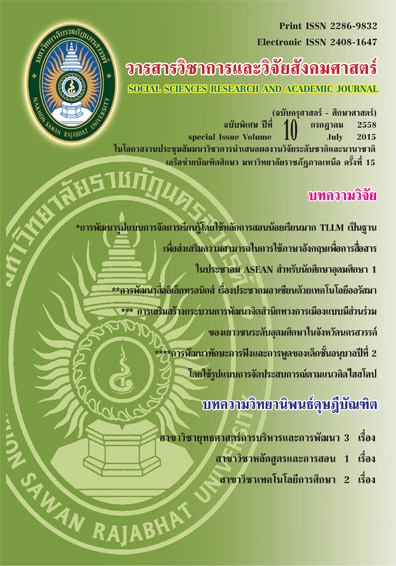การพัฒนารูปแบบการเรียนการสอนแบบผสมผสานเพื่อเสริมสร้างความรู้และสมรรถนะด้านนวัตกรรมและเทคโนโลยีสารสนเทศทางการศึกษา สำหรับนิสิตหลักสูตรการศึกษาบัณฑิตมหาวิทยาลัยศรีนครินทรวิโรฒ; The Development of A Blended Instructional Model To Enhancing Knowledge and Comp
Main Article Content
Abstract
บทคัดย่อ
การวิจัยครั้งนี้มีวัตถุประสงค์เพื่อพัฒนารูปแบบการเรียนการสอนแบบผสมผสานเพื่อเสริมสร้างความรู้และสมรรถนะด้านนวัตกรรมและเทคโนโลยีสารสนเทศทางการศึกษา สำหรับนิสิตหลักสูตรการศึกษาบัณฑิต มหาวิทยาลัยศรีนครินทรวิโรฒ กลุ่มตัวอย่าง คือ นิสิตระดับปริญญาตรี ชั้นปีที่ 3 สาขาวิชาจิตวิทยาการแนะแนว คณะศึกษาศาสตร์ มหาวิทยาลัยศรีนครินทรวิโรฒที่ลงทะเบียนเรียนรายวิชา ศษ 381 (สื่อ นวัตกรรม และเทคโนโลยีสารสนเทศเพื่อการสื่อสารการศึกษา) ภาคการศึกษาที่ 2 ปีการศึกษา 2557 จำนวน 50 คน สถิติที่ใช้ในการวิเคราะห์ข้อมูล ได้แก่ ร้อยละ (Percentage) ค่าเฉลี่ย () ส่วนเบี่ยงเบนมาตรฐาน (S.D.) และ t-test dependent sample
ผลการวิจัยพบว่า 1. รูปแบบการเรียนการสอนแบบผสมผสานเพื่อเสริมสร้างความรู้และสมรรถนะด้านนวัตกรรมและเทคโนโลยีสารสนเทศทางการศึกษา ประกอบด้วย 1) ปัจจัยนำเข้า (Input) ได้แก่ ด้านหลักสูตรและเนื้อหา ด้านมาตรฐานความรู้ ด้านผู้เรียน ด้านผู้สอน และด้านสภาพแวดล้อมการเรียนรู้ 2) กิจกรรมการเรียนการสอน (Process) ได้แก่ เรียนในห้องเรียนปกติ เรียนออนไลน์ เรียนในแหล่งทรัพยากรการเรียนรู้ และเรียนแบบโครงงาน 3) ผลลัพธ์ (Output) ได้แก่ ผลสัมฤทธิ์ทางการเรียน สมรรถนะ และความคิดเห็น และ 4) บทเรียนผ่านเครือข่ายอินเตอร์เน็ตที่พัฒนามีค่าประสิทธิภาพ เท่ากับ 82.78/81.00 2. ผู้เรียนมีผลสัมฤทธิ์ทางการเรียนหลังเรียนสูงกว่าก่อนเรียนอย่างมีนัยสำคัญทางสถิติที่ระดับ .05 3. ผู้เรียนมีระดับสมรรถนะอยู่ในระดับดี 4. ผู้เรียนมีความคิดเห็นต่อรูปแบบภาพรวมอยู่ในระดับมาก ( = 4.19, S.D. = 0.74)
Abstract
The present study was aimed to developing a blended instructional model to enhancing knowledge and competencies on educational innovation and information technology for bachelor of education students at Srinakharinwirot University. the sample group employed in the research, which consisted of 50 third-year bachelor-degree students majoring in guidance and counseling psychology in the Faculty of Education, Srinakharinwirot University, who were registered to study ED 381 (Media Innovation and Information Technology for Educational Communication) in the second year of education, 2014. The statistics used in data analysis were percentage, mean (), standard deviation (S.D.) and t-test dependent sample.
The research findings are as follows: 1. The components of the model consisted of 1) Input (course and content, learning standard, learner’s perspective, teacher’s perspective and learning environment); 2) Process; 3) Output and 4) Feedback. Furthermore, online learning produced an effectiveness score (E1/E2) of 82.78/81.00. 2. Learners’ learning post-test achievements were higher than the pre-test scores with statistical significance at .05. 3. Learners’ competencies was divided into achieve good learning; overall mean score equaled 88.41%, an excellent level; and Competencies 3) ability to seek a wide range of learning resources to promote learners’ education. The overall mean score equaled 91.97%, an excellent level. 4. The total mean score for learners’ opinion equaled 4.19 (S.D. = 0.74) was high.

